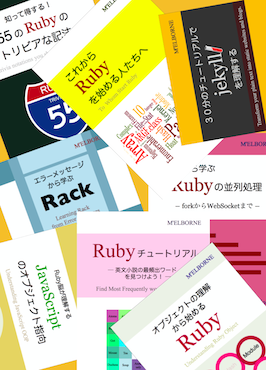Rubyチュートリアル ~英文小説の最頻出ワードを見つけよう!(その14)
Version20
ここまで来たらもう一歩。
小説データは元々ネットにあるんですから、いちいちファイルにダウンロードしないで、直接ネットから取れたらうれしいです。
open-uriライブラリというのを使うと、httpに簡単にアクセスできるようになります。
require "open-uri"
class WordDictionary
private
def input_to_string(input)
case input
when /^http/
begin
open(input) { |f| return f.read }
rescue Exception => e
puts e
exit
end
when String
begin
File.open(input, "r") { |f| return f.read }
rescue
puts "Argument has assumed as a text string"
input
end
when ARGF.class
input.read
else
raise "Wrong argument. ARGF, file or string are acceptable."
end
end
end
wdic = WordDictionary.new('http://www.gutenberg.org/files/245/245.txt')
p wdic.top_by_length(30)
#> [["inconsequentialities", 1, 20], ["straightforwardly", 1, 17], ["unenforceability", 1, 16], ["acquaintanceship", 3, 16], ["reproachlessness", 1, 16], ["misunderstanding", 1, 16], ["stenographically", 1, 16], ["preposterousness", 1, 16], ["responsibilities", 1, 16], ["incomprehensible", 1, 16], ["charlottesville", 1, 15], ["acknowledgments", 1, 15], ["unrighteousness", 2, 15], ["multitudinously", 1, 15], ["unphilosophical", 1, 15], ["impossibilities", 2, 15], ["inconspicuously", 1, 15], ["inconsequential", 2, 15], ["conscientiously", 1, 15], ["notwithstanding", 3, 15], ["merchantibility", 1, 15], ["architecturally", 2, 15], ["daguerreotypist", 1, 15], ["representations", 1, 15], ["unhandkerchiefs", 1, 15], ["correspondingly", 3, 15], ["picturesqueness", 2, 15], ["proportionately", 1, 15], ["unconsciousness", 1, 15], ["exemplification", 1, 15]]open-uriライブラリをrequireして、input_to_stringに新しい分岐条件を加えます。ネットアクセスがうまくいかない場合は、エラーメッセージを表示してスクリプトの実行を終了します。
これで一層便利になりました。
Version21
もう少し実用的なメソッドも追加しましょう。
オブジェクトを読みやすいかたちで出力するto_sメソッドと、オブジェクトの部分オブジェクトを返すselectメソッドを定義します。
class WordDictionary
def to_s
@freq_dic.to_s
end
def select(regexp)
text = @words.select { |key, val| key =~ regexp }.join(" ")
WordDictionary.new(text)
end
end次の例はselectメソッドにより、先頭がxyzの何れかで始まる語の集合からなる新しいWordDictionaryオブジェクトを生成し、これをto_sメソッドで出力しています。
wdic = WordDictionary.new(ARGF)
puts xyz_dic = wdic.select(/^[xyz]/)
p xyz_dic.top_by_length(5)
#> {"you"=>2071, "yes"=>90, "zealand"=>1, "your"=>597, "yourself"=>60, "yesterday"=>18, "yet"=>163, "young"=>144, "yer"=>4, "ye"=>90, "yelp"=>1, "youth"=>17, "yawned"=>3, "zigzag"=>1, "yours"=>26, "yards"=>2, "year"=>124, "yawning"=>3, "x"=>2, "yelled"=>1, "xi"=>1, "xii"=>3, "yard"=>1, "years"=>226, "zip"=>3, "youngest"=>15, "younger"=>30, "yielding"=>4, "yield"=>8, "yawn"=>2, "york"=>13, "yourselves"=>5, "younge"=>4, "youths"=>1, "yielded"=>5, "yale"=>4, "zeph"=>3, "zephaniah"=>1, "zech"=>2, "zion"=>4, "zealots"=>3, "zinzendorf"=>6, "xxxiii"=>1, "xxv"=>3, "xxvi"=>1, "y"=>8, "zama"=>1, "zealous"=>2, "xiii"=>8, "yea"=>6, "zinzendorfs"=>1, "xenophon"=>3, "youthful"=>1, "yearly"=>2, "xxix"=>1, "xh"=>1, "zoroaster"=>2, "xciii"=>1, "zeal"=>2, "zambezi"=>1, "xerxes"=>11, "xv"=>1, "yellow"=>1, "xxiii"=>1}
[["zinzendorfs", 1, 11], ["zinzendorf", 6, 10], ["yourselves", 5, 10], ["zoroaster", 2, 9], ["zephaniah", 1, 9]]さてずいぶんと長い道のりを来ました。スクリプトは一時僅か3行にまで短くできたのに、現在80行を超えるまでに肥大化しました。ワードエコではありません。
ここで最初のコードと3行のコードと、現在のコードとを見比べてみましょうか。
Version01
dic = Hash.new(0)
while line = ARGF.gets
line.downcase!
while line.sub!(/[a-z]+/, "")
word = $&
dic[word] += 1
end
end
p dic.sort { |a, b| b[1] <=> a[1] }[0...30]Version03
WORDS = ARGF.read.downcase.scan(/[a-z]+/)
DICTIONARY = WORDS.inject(Hash.new(0)) { |dic, word| dic[word] += 1 ; dic }
p DICTIONARY.sort { |a, b| b[1] <=> a[1] }[0...30]Version21
require 'open-uri'
module Enumerable
def take_by(nth)
sort_by { |elem| yield elem }.take(nth)
end
end
class WordDictionary
include Enumerable
def initialize(input)
input = input_to_string(input)
@words = input.downcase.scan(/[a-z]+/)
@freq_dic = @words.inject(Hash.new(0)) { |dic, word| dic[word] += 1 ; dic }
end
def each
@freq_dic.each { |elem| yield elem }
end
def top_by_frequency(nth, &blk)
take_by_value(nth, lambda { |v| -v }, &blk)
end
def bottom_by_frequency(nth, &blk)
take_by_value(nth, lambda { |v| v }, &blk)
end
def top_by_length(nth, &blk)
list = take_by_key(nth, lambda { |key| -key.length }, &blk)
list.map { |word, freq| [word, freq, word.length] }
end
def to_s
@freq_dic.to_s
end
def select(regexp)
text = @words.select { |key, val| key =~ regexp }.join(" ")
WordDictionary.new(text)
end
private
def input_to_string(input)
case input
when /^http/
begin
open(input) { |f| return f.read }
rescue Exception => e
puts e
exit
end
when String
begin
File.open(input, "r") { |f| return f.read }
rescue
puts "Argument has assumed as a text string."
input
end
when ARGF.class
input.read
else
raise "Wrong argument. ARGF, file or string are acceptable."
end
end
def take_by_value(nth, sort_opt, &blk)
val = lambda { |key, val| val }
take_by_key_or_val(nth, sort_opt, val, &blk)
end
def take_by_key(nth, sort_opt, &blk)
key = lambda { |key, val| key }
take_by_key_or_val(nth, sort_opt, key, &blk)
end
def take_by_key_or_val(nth, sort_opt, by)
@freq_dic.select { |key, val| block_given? ? yield(val) : val }.take_by(nth) { |key, val| sort_opt[by[key, val]] }
end
end
wdic = WordDictionary.new(ARGF)
p wdic.top_by_frequency(20)確かにスクリプトは肥大化しています。果たして今までの労力は無駄だったんでしょうか。ワードエコでなくなった分、よくなったことがあるんでしょうか。
はい、あります。それは単語辞書が、単なる制御構造からオブジェクトになったことです。
オブジェクトになった利点の1つは、コードがポータブルになるということです。つまりそれが持つデータを維持しながら、他のオブジェクトに送って相互作用させたり、データベースに保存したりできます。同時に内容の異なる複数の辞書オブジェクトを生成し、これらを相互に連携して結果を得る(内容の比較とか)といったこともできるようになります。これらはネットワーク越しであってもかまいません。
他の利点は機能の追加が容易になる点です。クラスにメソッドを追加することで、単語辞書を対象にした新たな機能が容易に追加できます。既にいくつかの機能追加を見てきました。
最初のヴァージョンのスクリプトに機能を追加することを想像頂ければ、この利点は明らかでしょう。このようにオブジェクトは機能追加のフレームワークになっているのです。
今までの苦労も、未来に対する投資というかたちで報われそうです。そろそろ幕を閉じるときが来たようです。
(次回に続く)
blog comments powered by Disqus
